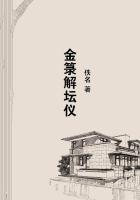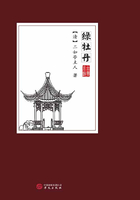But our age, receiving the republic as a chef-d'oeuvre of another age which has already begun to grow old, has not merely neglected to restore the colors of the original, but has not even been at the pains to preserve so much as the general outline and most outstanding features.For what survives of that primitive morality which the poet called Rome's safeguard? It is so obsolete and forgotten, that, far from practising it, one does not even know it.And of the citizens what shall I say? Morality has perished through poverty of great men; a poverty for which we must not only assign a reason, but for the guilt of which we must answer as criminals charged with a capital crime.For it is through our vices, and not by any mishap, that we retain only the name of a republic, and have long since lost the reality."This is the confession of Cicero, long indeed after the death of Africanus, whom he introduced as an interlocutor in his work De Republica, but still before the coming of Christ.Yet, if the disasters he bewails had been lamented after the Christian religion had been diffused, and had begun to prevail, is there a man of our adversaries who would not have thought that they were to be imputed to the Christians? Why, then, did their gods not take steps then to prevent the decay and extinction of that republic, over the loss of which Cicero, long before Christ had come in the flesh, sings so lugubrious a dirge? Its admirers have need to inquire whether, even in the days of primitive men and morals, true justice flourished in it; or was it not perhaps even then, to use the casual expression of Cicero, rather a colored painting than the living reality? But, if God will, we shall consider this elsewhere.For I mean in its own place to show that--according to the definitions in which Cicero himself, using Scipio as his mouthpiece, briefly propounded what a republic is, and what a people is, and according to many testimonies, both of his own lips and of those who took part in that same debate--Rome never was a republic, be cause true justice had never a place in it.
But accepting the more feasible definitions of a republic, I grant there was a republic of a certain kind, and certainly much better administered by the more ancient Romans than by their modern representatives.But the fact is, true justice has no existence save in that republic whose founder and ruler is Christ, if at least any choose to call this a republic; and indeed we cannot deny that it is the people's weal.But if perchance this name, which has become familiar in other connections, be considered alien to our common parlance, we may at all events say that in this city is true justice; the city of which Holy Scripture says, "Glorious things are said of thee, O city of God."CHAP.22.--THAT THE ROMAN GODS NEVER TOOK ANY STEPS TO PREVENT THE REPUBLICFROM
BEING RUINED BY IMMORALITY.
But what is relevant to the present question is this, that however admirable our adversaries say the republic was or is, it is certain that by the testimony of their own most learned writers it had become, long before the coming of Christ, utterly wicked and dissolute, and indeed had no existence, but had been destroyed by profligacy.To prevent this, surely these guardian gods ought to have given precepts of morals and a rule of life to the people by whom they were worshipped in so many temples, with so great a variety of priests and sacrifices, with such numberless and diverse rites, so many festal solemnities, so many celebrations of magnificent games.But in all this the demons only looked after their own interest, and cared not at all how their worshippers lived, or rather were at pains to induce them to lead an abandoned life, so long as they paid these tributes to their honor, and regarded them with fear.If any one denies this, let him produce, let him point to, let him read the laws which the gods had given against sedition, and which the Gracchi transgressed when they threw everything into confusion; or those Marius, and Cinna, and Carbo broke when they involved their country in civil wars, most iniquitous and unjustifiable in their causes, cruelly conducted, and yet more cruelly terminated; or those which Sylla scorned, whose life, character, and deeds, as described by Sallust and other historians, are the abhorrence of all mankind.Who will deny that at that time the republic had become extinct?
Possibly they will be bold enough to suggest in defence of the gods, that they abandoned the city on account of the profligacy of the citizens, according to the lines of Virgil:
"Gone from each fane, each sacred shrine, Are those who made this realm divine."(1)But, firstly, if it be so, then they cannot complain against the Christian religion, as if it were that which gave offence to the gods ant caused them to abandon Rome, since the Roman immorality had long ago driven from the altars of the city a cloud of little gods, like as many flies.And yet where was this host of divinities, when, long before the corruption of the primitive morality, Rome was taken and burnt by the Gauls? Perhaps they were present, but asleep? For at that time the whole city fell into the hands of the enemy, with the single exception of the Capitoline hill;and this too would have been taken, had not--the watchful geese aroused the sleeping gods! And this gave occasion to the festival of the goose, in which Rome sank nearly to the superstition of the Egyptians, who worship beasts and birds.But of these adventitious evils which are inflicted by hostile armies or by some disaster, and which attach rather to the body than the soul, I am not meanwhile disputing.At present I speak of the decay of morality, which at first almost imperceptibly lost its brilliant hue, but afterwards was wholly obliterated, was swept away as by a torrent, and involved the republic in such disastrous ruin, that though the houses and wails remained standing the leading writers do not scruple to say that the republic was destroyed.














